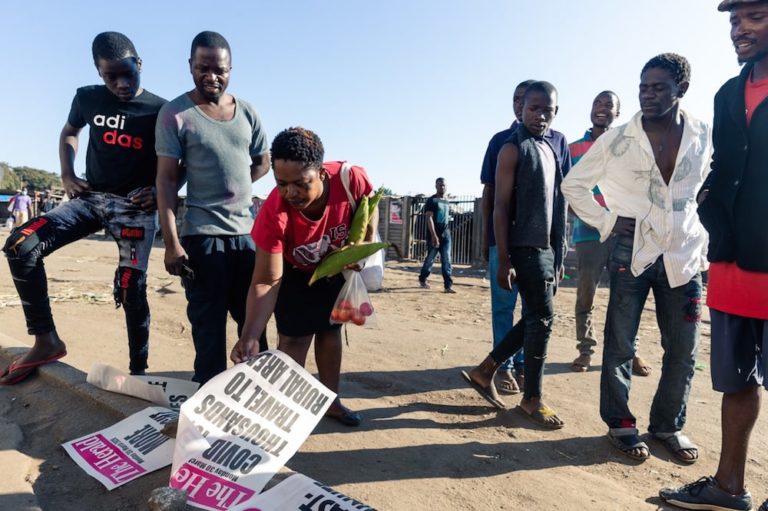(MISA/IFEX) – Media rights organisations and editors have called on the Namibian government to review the restrictive media provisions proposed in a new Defence Bill and make it compatible with the Namibian constitution. MISA and the Legal Assistance Centre (LAC) said they were “gravely concerned” about provisions in the bill relating to the media. The […]
(MISA/IFEX) – Media rights organisations and editors have called on the Namibian government to review the restrictive media provisions proposed in a new Defence Bill and make it compatible with the Namibian constitution.
MISA and the Legal Assistance Centre (LAC) said they were “gravely concerned” about provisions in the bill relating to the media.
The draft legislation was tabled in the National Assembly on Tuesday 25 September 2001 by Defence Minister Erkki Nghimtina.
When approached for comment, Nghimtina said that Namibia was trying to avoid calamities similar to the recent terrorist attack on the United States. “Well there is democracy in our country but we can’t have unguided democracy. There are limitations to every democracy. Look at what happened to the Americans. We can’t publish information when for instance our troops are going on a mission. But we can report on them [troops] when they are returning from a mission,” he added.
Kaitira Kandjii, MISA’s regional information co-ordinator, stated that “besides the fact that provisions of the bill are in direct conflict with the right to freedom of expression thereby rendering it liable to a constitutional challenge, MISA is particularly concerned about sections 54 and 55 of the Defence Bill which penalises the disclosure of ‘unauthorised’ information, and which prohibits the taking of photographs or making sketches, plans, models or notes of military premises or installations.” He said that these sections are broad in allocating rights to military office bearers “but fail to ensure that these rights are balanced in the framework of the constitutional guarantees to freedom of expression and media freedom.”
Kandjii said MISA recognises the right of governments to enact legislation that ensures the protection of its territory and security of its citizens but “this legislation should however impose the least restrictive means possible in protecting [national security] and should be compatible with the Namibian constitution.”
“Everyone has the right to information from public authorities, including information relating to national security. No restriction on this right should be imposed on the grounds of national security, unless the government can demonstrate that the restriction is prescribed by law and is necessary in a democratic society to protect a legitimate national security interest,” he said. “Public interest in obtaining the information should be a primary consideration.”
Prominent media lawyer Dave Smuts said sections of the bill related to the press were unconstitutional. “[They] appear to be over broad and are in conflict with the right to freedom of expression. It goes beyond the protected rights.” He said the courts are likely to strike down the provisions. “It gives rise to a constitutional challenge. The bill could be applied in an unconstitutional manner to suppress freedom of expression,” he added.
LAC Director Clement Daniels said the provisions were too wide and certain sections were vague and unconstitutional. He said it was not true that the media is not security conscious, as claimed by Nghimtina in the National Assembly. “If the Defence Ministry was forthcoming with information, there would be no need for the media to speculate,” he added.
Editor of “The Namibian” Gwen Lister said if the bill is passed in its present form “it would make serious inroads into the freedom of the press.” “The phrase ‘national security’ can mean almost anything and the Defence Bill doesn’t really narrow it down to specifics,” she added.
She said most media “as a matter of course do not photograph military installations and/or specify troop movements. It is hard therefore to imagine we have ever put our country’s ‘national security’ in jeopardy. We did have differences with the Ministry over our reportage about our military involvement in the DRC, which mainly concerned our casualty figures, which we believe is in the public interest and does not conflict with national security. These differences were later sorted out.”
“We have a duty to inform the public and the Defence Bill in its present form will put serious constraints on our ability to do so,” she said. “If the government feels we are not ‘security conscious’ then it is really incumbent upon them to back it up with facts.”
Lister also took issue with Nghimtina’s attempt to justify the legislation by referring to the recent terrorist attacks in the United States. “What on earth do the attacks on the trade centre have to do with the US media?” she asked.
“Republikein 2000” editor Chris Jacobie said it was unacceptable for the minister to suggest that journalists would be irresponsible and report in such a way as to endanger the security of this country. “We are first Namibians before we are journalists.” He said the newspaper would ask its legal advisers to look into the bill, “to give us advice on how to react if this bill is passed. We still have ample time to make a contribution to influence the bill before it becomes a law.”
“We know that there is no absolute freedom… but if there are unreasonable restrictions we will protest … and even ignore some of those restrictions. We will take all necessary steps to make sure that unreasonable restrictions are not imposed on the media,” he said.
BACKGROUND:
On 25 September, the government unveiled a new Defence Bill which includes draconian measures that attempt to restrict the media’s reporting on military activities.
Defence Minister Nghimtina said in the National Assembly that it would be an offence to publish “information calculated or likely to endanger national security or the safety of members of the Defence Force.”
According to the minister, such measures were necessary “as we realised that editors, proprietors and printers were not security conscious and that their actions can compromise the security of the country and safety of our members if not controlled.”
The Ministry of Defence has never consulted the media on the controversial clause.
The bill also makes it an offence to take “photographs, make sketches, plans, models or notes of military premises or installations.” He said the reasons behind the prohibition are “very obvious. Nowhere in the world are military installations allowed to be photographed for pleasure.”
The draft law also authorises military personnel to seize cameras and films if they think they have been used to photograph military sites.
The bill makes it illegal for Namibians to serve in the force of any country, without written permission from the minister of defence. Namibian citizens residing in other countries and who are able to serve in the military force, reserve or auxiliary force of those countries must obtain written authorisation before doing so.
The bill also exonerates the state and the Ministry of Defence from possible claims by spouses, parents, children, or other dependents for the loss of lives and properties of persons “conveyed in vehicles, aircraft or vessels” of the state, used on behalf of the Defence Force.
A Council of Defence and a Defence Staff Council are envisaged under the bill. The Council of Defence will be responsible for setting guidelines on the country’s defence strategy and will be chaired by President Sam Nujoma, while the Defence Staff Council, to be chaired by the minister of defence, will be responsible for policy concerning the defence of the country.
(Source: The Namibian)


